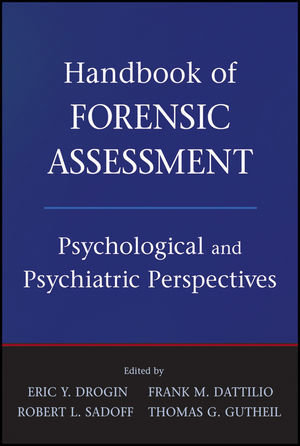The first handbook to explore forensic assessment frompsychiatric and psychological perspectives"The editors have assembled a magnificent collaboration betweenpsychiatrists and psychologists to bring forth critical knowledgeand insight to the core competency of forensic assessment. Thishandbook is essential reading and a comprehensive resource for bothnewly minted and seasoned forensic practitioners."--Robert I. Simon, MD, Director, Program in Psychiatryand Law, Georgetown University School of Medicine"This long-awaited resource blows the dust off traditionalstandards, shakes the cobwebs out of our old ways of thinking, andshows the practical steps in producing work that will make sense tojuries and withstand the most skillful cross-examination. . . .[T]here is no better resource."--Kenneth S. Pope, PhD, ABPP, Diplomate in ClinicalPsychology; coauthor, Ethics in Psychotherapy and Counseling,Fourth Edition"From preparation to collection to interpretation tocommunication of the results, this excellent, comprehensivetreasure shows how to conduct forensic assessments. Each splendidevidence-based chapter is presented from the collaboration betweenpsychologists and psychiatrists. It is a must-have resource forforensic experts as well as general practitioners or anyone wishingto understand standard of care in forensic assessment."--Melba Vasquez, PhD, ABPP, 2011 American PsychologicalAssociation PresidentThe practitioner-oriented coverage in the Handbook ofForensic Assessment examines:* The current state of psychology and psychiatry--includingrequisite clinical competencies, ethical guidelines, andconsiderations of multidisciplinary collaboration* Various approaches to assessments in criminal and civilmatters* The principles of effective preparation, data collection, andinterpretation, as well as communication for each specialsituation* Topics including competence to stand trial, sexual offenderevaluations, addictions, child abuse, and education* Overarching practice issues, such as practice development,retention, compensation, consultation, and forensic treatment* Includes sample reports that demonstrate the integrativepotential of both psychology and psychiatryIncorporating a wealth of current and multidisciplinaryresearch, the Handbook of Forensic Assessment is destined tobecome every mental health professional's most valuable one-stopreference for their forensic work.

